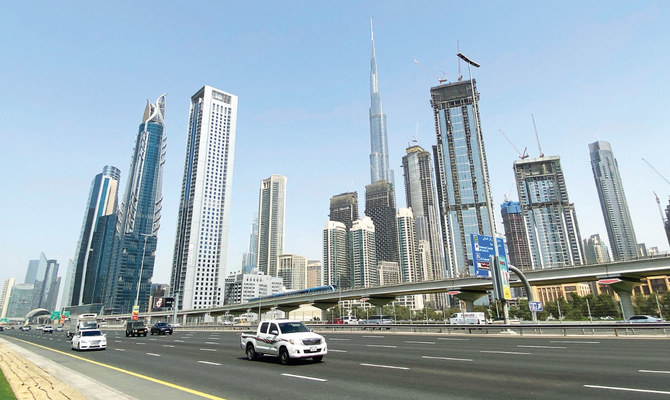RIYADH: Saudi Arabia’s non-oil exports to Gulf Cooperation Council countries saw a 42 percent annual increase in the final three months of 2023, according to official data.
Information released by the Kingdom’s General Authority of Statistics showed the total value of these transactions reached SR20.8 billion ($5.55 billion), primarily due to an increase in re-exports, which rose by 106 percent to hit SR11.34 billion.
Re-exports – goods imported into a country and then exported to another without significant processing or alteration – accounted for 55 percent of total non-oil shipments to Bahrain, Kuwait, and Oman, as well as Qatar, and the UAE.
Among these GCC nations, the UAE emerged as the top destination, receiving 67 percent of the non-oil shipments from Saudi Arabia, totaling SR14 billion. Of these transactions, approximately 61 percent were re-exports, representing a 97 percent growth during this period.
Factors contributing to this surge in re-exports could include the solid economic bonds among GCC nations, fostering a unified market that facilitates the free flow of goods and services.
Saudi Arabia’s strategic position as a central hub within the GCC region could also minimize transportation expenses and transit durations due to its proximity.
Moreover, the Kingdom’s modern and well-developed infrastructure, encompassing ports, airports, and road networks, further streamlines the movement of goods, potentially influencing this uptick in re-exports.
Additionally, the GCC region’s strategic location on major trade routes allows for efficient redistribution of goods and services. Taking advantage of this, the countries are developing logistics hubs to facilitate the movement of both domestic and transit goods.
Saudi Arabia also aims to revolutionize its container-shipping sector, mirroring its efforts in non-oil industries like electric cars and renewable energy.
With plans to expand inland logistics hubs and improve rail connections, the country seeks to increase annual container throughput to 40 million twenty-foot equivalent units by 2030.
This ambition aligns with the grand scale of projects such as the $500 billion NEOM scheme, featuring a 170-km. city and a container port with a 9 million TEU capacity.
The giga-project will also include the Oxagon port, slated to become the largest floating structure globally, situated at the nexus of three continents.
The robust economic ties between the UAE and Saudi Arabia are further demonstrated through their mutual investments.
By the end of 2022, the UAE had amassed a significant foreign direct investment stock of SR104 billion in Saudi Arabia, as reported by the General Authority of Statistics. This substantial investment
plays a pivotal role in bolstering their economic partnership, fostering growth, and has paved the way for the expansion of non-oil trade activities between the two nations.
Transport equipment accounted for 31 percent of non-oil exports to the UAE from the Kingdom in the final quarter of 2023, reaching a value of SR4.39 billion in what is a 145 percent increase.
Machinery and electrical parts constituted another 27 percent, totaling SR3.75 billion with a 67 percent rise.
Additionally, chemical industry products accounted for 10 percent, reaching SR1.44 billion – a 17 percent increase during this period.
Among the GCC countries, trade with Qatar experienced the most substantial growth, with non-oil exports to the country soaring by 439 percent. Of these exports, 61 percent comprised transport equipment amounting to SR888 million, while 18 percent were chemical industry products totaling SR255 million.
Saudi Arabia and Qatar are actively working to enhance their economic, military, sports, and cultural ties. This push comes after the meeting of the Saudi-Qatari Coordination Council, attended by Crown Prince Mohammed bin Salman and Qatar’s Emir, Sheikh Tamim bin Hamad, in December.
The leaders consider the council vital for communication and coordination, underlining the importance of expanding cooperation to drive sustainable growth and prosperity for both nations and their citizens.
The non-oil trade balance with the GCC saw a substantial 90 percent annual increase in the fourth quarter of 2023, although imports still exceeded non-oil exports by SR489 million.
Around 68 percent of Saudi Arabia’s imports from the GCC countries originated from the UAE, which saw a 22 percent rise to SR14.37 billion.
In contrast, imports from other nations in the economic bloc decreased, with Kuwait experiencing the most significant decline of 49 percent to SR351 million.
Mineral products account for the largest share of imports from the UAE at 33 percent, amounting to SR4.8 billion, followed by pearls and other jewelry at 19 percent, totaling SR2.7 billion.
Industrial equipment, chemicals, and plastics made up 16 percent at SR2.3 billion.























